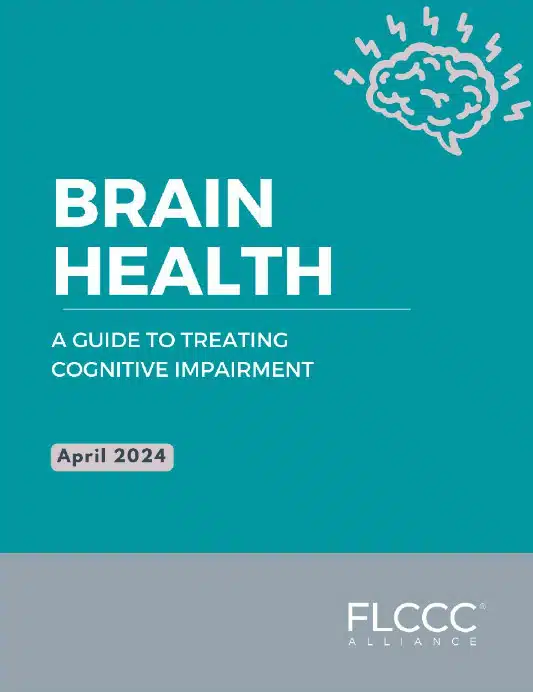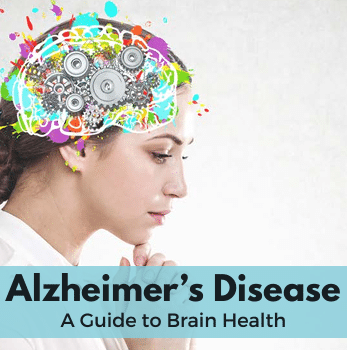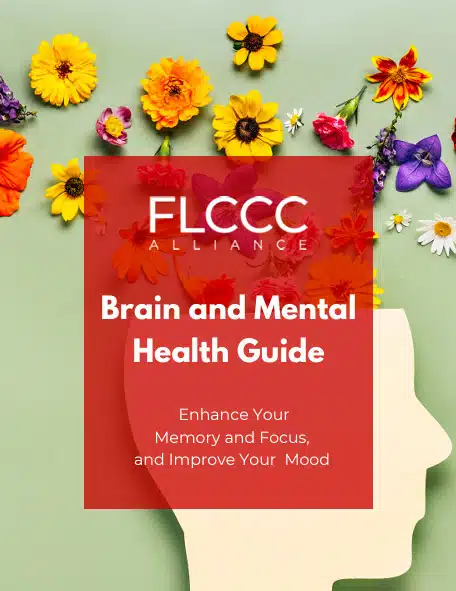Alzheimer’s & dementia prevention is possible. Here are 8 tips to help prevent Alzheimer’s disease, from exercise to stress and more.

Alzheimer’s disease is a serious concern for many people, especially those with a family history of the condition. The question often asked is, “Can Alzheimer’s be prevented?” While there is no guaranteed way to prevent Alzheimer’s disease, research suggests that several lifestyle changes and habits can enhance brain health and potentially reduce the risk of developing this troublesome condition.
FLCCC Senior Fellow of Neurology, Dr. Suzanne Gazda, notes that more people are developing signs of dementia at younger ages. Recent studies have linked COVID-19 and the COVID-19 injections to cognitive impairment, with 11 studies supporting this connection. Most recently, a study from South Korea found that Alzheimer’s rates jumped 23% post-injection. Dr. Gazda points out that many neurologists are now booked out for 4 to 6 months due to a “tsunami of neurological issues” stemming from pandemic response measures.
If you or a loved one is showing signs of Alzheimer’s, there are ways to reduce the risk. In this post, we’ll start with a few frequently asked questions, followed by some research-backed tips to delay or prevent dementia. Importantly, none of these suggestions involve taking medication; rather, they are all part of a healthy lifestyle that can benefit your overall well-being.
Much of the research and guidance in this post comes from the following FLCCC guides and treatment protocols, created by our clinical team and expert contributors:
Can Alzheimer’s Be Prevented if Caught Early?
Early detection of Alzheimer’s disease can play a crucial role in managing its progression. The disease is treatable, and catching Alzheimer’s early allows for timely interventions that can slow down the disease’s advancement. Early detection typically involves recognizing early signs such as mild memory loss, difficulty with problem-solving, and subtle changes in personality or behavior.
These interventions, although not proven to prevent Alzheimer’s entirely, can significantly help reduce the risk of severe cognitive decline and improve the quality of life for individuals affected. Much of what we cover in this post is also covered in the following webinar:
Can We Prevent Alzheimer’s Before it Even Starts?
Preventing Alzheimer’s disease before it starts focuses on adopting a proactive approach to brain health. This involves integrating lifestyle changes known to boost cognitive function and reduce the risk of developing Alzheimer’s.
By maintaining a healthy diet, regular physical activity, mental stimulation, and social engagement, we can create a strong foundation for brain health that may help prevent Alzheimer’s disease and related dementias.
What Are The Main Causes of Alzheimer’s Disease?
Alzheimer’s disease is a complex condition with several contributing factors. While the exact cause of Alzheimer’s is not fully understood, research has identified several key factors that increase the risk of developing the disease:
- Genetics: Family history and specific genes, such as the APOE ε4 allele.
- Age: Increased risk significantly after age 65.
- Lifestyle Factors: Poor diet, lack of physical activity, smoking, and excessive alcohol consumption.
- Chronic Conditions: High blood pressure, diabetes, and high cholesterol.
- Head Injuries: Serious head injuries or repeated trauma to the head.
- Environmental Factors: Exposure to certain environmental toxins and pollutants.
- Excess Spike Protein: High levels of spike protein from long COVID and long vax.
8 Healthy Lifestyle Tips to Reduce Risk of Dementia
Dr. Gazda says we can optimize brain health primarily by going after “the low-hanging fruit”. Lucky for all of us, there is a lot of it to pick! Here are 8 ways to protect your brain from Alzheimer’s:
- Exercise Regularly
- Manage Stress
- Get Adequate Sleep
- Maintain a Healthy Diet
- Stay Socially Active
- Engage in Mental Stimulation
- Practice Intermittent Fasting
- Brain Health Supplements
1. Exercise Regularly
Physical activity, particularly aerobic exercises like walking, swimming, or cycling, as well as resistance training, increases blood flow to the brain. This improvement in circulation can enhance cognitive function and reduce the risk of neurodegenerative diseases like Alzheimer’s.
Regular physical activity is also associated with a lower risk of cardiovascular disease, which is a risk factor for dementia and Alzheimer’s disease. Exercise promotes the growth of new blood vessels in the brain and even the abundance and survival of new brain cells.
Exercise also helps the body create something called BDNF, or Brain-Derived Neurotrophic Factor, a protein that plays a crucial role in the health and function of neurons in the brain
Key Takeaways:
- Aerobic and resistance exercises increase blood flow to the brain.
- Regular exercise can reduce the risk of neurodegenerative diseases.
- Aim for at least 150 minutes of moderate-intensity exercise weekly.
👉 Learn more: Fitness and Strength Training Guide
2. Manage Stress
Chronic stress can have a detrimental effect on brain health, contributing to memory loss and cognitive decline. Stress management is crucial in dementia prevention. Practices such as mindfulness, yoga or Tai Chi, and breathing exercises can significantly reduce stress levels and improve your quality of life.
Managing stress may help prevent or delay Alzheimer’s by protecting the brain from the negative impacts of stress hormones like cortisol. Chronic stress is linked to inflammation and a decrease in brain volume in areas responsible for memory and emotional regulation.
Incorporating daily stress-reduction techniques can be a powerful tool in maintaining brain health and preventing Alzheimer’s disease.
Key Takeaways:
- Chronic stress negatively impacts brain health.
- Mindfulness, yoga, and breathing exercises can reduce stress.
- Reducing stress may help lower the risk of Alzheimer’s.
👉 Learn more: Guide to Managing Stress
3. Get Adequate Sleep
Adequate sleep is essential for brain health. Aim for 7–8 hours of restorative sleep each night. Quality sleep helps the brain consolidate memories and remove toxins, lowering the risk of cognitive decline and Alzheimer’s disease. During deep sleep, the brain’s glymphatic system clears out waste products that accumulate during the day.
Poor sleep is linked to a higher risk of Alzheimer’s, as it leads to the buildup of amyloid plaques, which may be part of the Alzheimer’s disease equation. Pay attention to sleep hygiene by avoiding bright lights and electronic screens before bedtime, keeping your bedroom cool and dark, and maintaining a consistent sleep schedule.
Key Takeaways:
- Aim for 7–8 hours of restorative sleep nightly.
- Quality sleep helps clear brain toxins and consolidate memories.
- Good sleep hygiene can prevent dementia.
Learn more with these two videos by Dr. Been looking at the importance of sleep for the brain:

4. Maintain a Healthy Diet
A nutritious diet rich in fruits, vegetables, whole grains, and lean proteins (such as the Mediterranean diet) provides essential nutrients that support brain health. Omega-3 fatty acids found in fish, such as salmon and sardines, and antioxidants from fruits and vegetables, can help protect the brain from oxidative stress and inflammation.
These nutrients are vital in reducing the risk of cognitive decline and dementia. The Mediterranean diet, which emphasizes whole grains, healthy fats, and a variety of colorful fruits and vegetables, is associated with a lower risk of Alzheimer’s disease.
Incorporate foods like leafy greens, berries, nuts, and seeds into your diet to help prevent dementia and promote overall brain health.
Key Takeaways:
- A Mediterranean diet supports brain health.
- Omega-3 fatty acids and antioxidants reduce inflammation.
- Include leafy greens, berries, nuts, and seeds in your diet.
👉 Learn more: The Eat Well Guide
5. Stay Socially Active
Engaging in regular social interactions can prevent depression and stress, both of which are risk factors for cognitive decline and dementia. Social activities stimulate the brain through conversation and emotional connections, supporting better emotional health and cognitive function.
Staying socially active can help reduce your risk of dementia and related dementias. Socialization can involve participating in group activities, volunteering, joining clubs or organizations, and maintaining close relationships with family and friends.
Studies show that people with robust social networks have a lower risk of developing dementia, including Alzheimer’s disease.
Key Takeaways:
- Social interactions can prevent depression and stress.
- Social activities stimulate the brain and support emotional health.
- Strong social networks are linked to a lower risk of dementia.
👉 Learn more: The Importance of Social Connectedness for Mental Health
6. Engage in Mental Stimulation
Dr. Gazda says we should never go to bed without learning 4 or 5 new things the day before. If you aren’t doing that already, it’s one easy way to potentially increase neuroplasticity.
Keeping your brain active through mentally stimulating activities, such as puzzles, reading, or learning new skills, can build cognitive reserve. This reserve helps keep the brain active and may delay the onset of cognitive decline and Alzheimer’s. Activities that challenge the brain are crucial for maintaining cognitive health and reducing the risk of dementia.
Engage in activities like learning a new language, playing musical instruments, or participating in strategy games that require problem-solving and critical thinking. The more you challenge your brain, the stronger and more resilient it becomes, potentially delaying the symptoms of Alzheimer’s disease.
Key Takeaways:
- Mentally stimulating activities build cognitive reserve.
- Brain challenges can delay cognitive decline and Alzheimer’s.
- Learn new skills, languages, or play strategy games.
👉 Learn more: 5 Ways to Optimize Your Aging Brain
7. Practice Intermittent Fasting
Ever heard of intermittent fasting? It’s also known as time-restricted eating, and, Alzheimer’s prevention research indicates that it can really help slow the progression of the disease.
This simple practice, which usually requires you to skip breakfast and stop eating at 8pm, helps to stave off dementia, and it does so via a starting array of mechanisms:
- Enhances autophagy
- Reduces oxidative stress and inflammation
- Promotes BDNF
- Improves insulin sensitivity
- Supports ketogenesis
- Activates cellular repair mechanisms
Click below to learn how intermittent fasting may help reduce the risk of Alzheimer’s:
- Webinar: Intermittent Fasting and Brain Health
- Video: Intermittent Fasting and Alzheimer’s Disease
- Blog Post: 5 Key Brain Benefits of Intermittent Fasting
8. Brain Health Supplements
There are plenty of great supplements for brain health. Some estimates say that up to 40% of North Americans are vitamin D deficient. Besides getting some sunshine, it’s incredibly cheap and easy to start adding vitamin D to your daily supplement routine.
The best thing about many brain health supplements is that they come with many benefits beyond just helping your brain, as is the case with vitamin D and many others that are generally recommended for brain health.
This is the closest thing to “taking a pill” that we’ll recommend in this article! Get started by talking to your doctor about adding some of the items below to your regimen:
- Magnesium (Especially Magnesium L-Threonate)
- Vitamin D
- Resveratrol
- Curcumin (Turmeric)
- Omega-3 Fatty Acids
Get Started With Healthy Lifestyle Choices Today!
While there is no surefire way to prevent Alzheimer’s disease, adopting these healthy lifestyle habits can significantly enhance your brain health and may help reduce your risk of Alzheimer’s.
Remember, it’s never too early or too late to start making these positive changes. These strategies help in Alzheimer’s prevention and contribute to overall well-being and healthy aging. Embrace these lifestyle choices to protect your brain and reduce your risk of Alzheimer’s and other forms of dementia.









